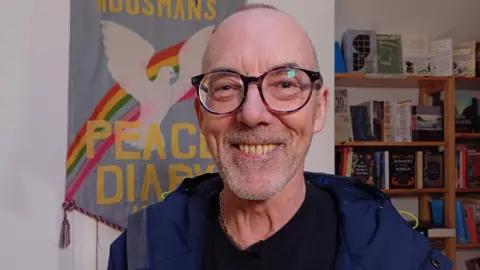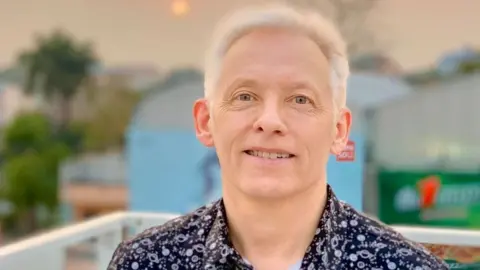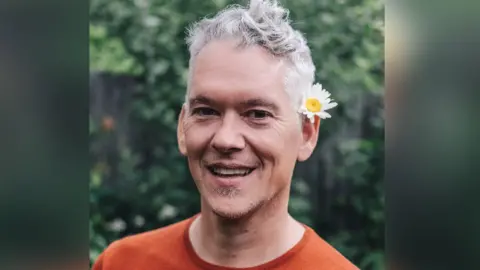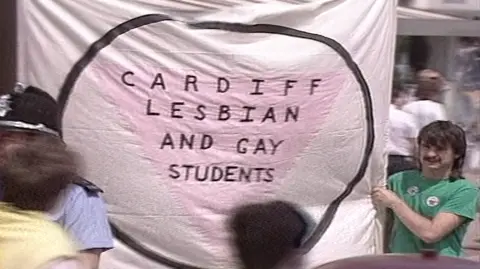'Miners showing solidarity at Pride 40 years ago was significant'
Forty years ago Dai Donovan was walking through the streets of London leading the LGBTQ+ community at Pride.
But Dai was not a gay man, he was a Welsh miner showing the friendship and solidarity that miners and their families had received from the gay community the previous year.
Meanwhile closer to his home, a small band of people were holding Cardiff's first ever Pride event.
Dai said those events were a landmark moment as it was the first time the public recognised how people were being vilified by society because of their sexuality.
"The mining families attending London Pride in 1985 was important because it was the very first time since the strike that members had to show their friendship, but more importantly their solidarity with the gay community," he said.
The 78-year-old said it was a visible sign to gay people that they had a powerful ally in the union and a chance to use its knowledge of creating political change to end centuries of discrimination.
Dai, from Ynyswen in the upper Swansea Valley, became a member and representative of the Neath, Swansea and Dulais Valleys Miners' Support Group.
The group was important as it supported the striking families in the area by raising funds.
"As the strike got longer and the local resources were insufficient to feed all the families, we needed to look further afield for the money and this is how I became the representative for the support group in London where I was asked to pick up a donation from a group of gay people in London," he said.
Dai said during the strike the help they received was all "one way", as gay men took personal risks, even from within the gay community, to raise money for the miners.
"It was after the strike that miners repaid this 'debt' they felt by acting in solidarity and openly with gay people by identifying with them and their issues."
As well as attending Pride, he said this also included supporting a motion at the Labour Party Conference to introduce legislation to end discrimination of someone because of their sexuality.
'Live their life freely'
Dai said there was a feeling from both groups that the state was organising "against us" - although he said the harsh treatment of gay people was "deeper ingrained because of their long history of oppression".
"For me and my wife then we had two young children, a boy and a girl, and if they grew up to be gay, we did not want them to live with the oppression we knew gay people lived under," Dai said.
"I wanted to see a situation where a gay man or woman living in small communities in our valleys didn't feel they had to move to London to live their life freely and open to love who they wished.
"If they wanted to go to London for the 'excitement' then fine, but if they wished to live as a gay person in our villages then they could without fear or repression."

Mike Jackson was the secretary of Lesbians and Gays Support the Miners (LGSM) and said coming from a mining town, it was natural for him to support the miners - but what was different was doing it as a young gay man.
LGSM's support and fundraising inspired Bafta award-winning film Pride.
"I'm proud of what we have done, but it wasn't all due to us, there were brave people before us who paved the way and laid the path."
The 71-year-old, originally from Accrington but who has lived most of his life in London, said he was inspired by what he saw when a group of South Asian women went on strike in revolt at poor working conditions at the Grunwick film processing factory in the 1970s.
"There were tens of thousands of people there and what stuck in my mind was all these Asian women speaking with the Yorkshire miners supporting them. It was amazing."
He added that when it came to the gay community it "wasn't a big chasm" for the miners to support them.
Mike said attending his first Pride march in 1974 with only "about 2,000 people" was really important to "stand up" and be visible.
"To do that with allies though is hugely important. The LGBT community will always be a minority community, we need allies."
He added Pride was significant now 40 years later just as much as it was then.
"There are negative elements still happening globally to the LGBT community," he said.
"There is every reason for us to maintain a loud, noisy and joyous presence in our streets."
Meanwhile, at around the same time in Cardiff, Tim Foskett came up with the idea of holding a Pride event in Cardiff, with Francis Edwin Brown helping to organise it.
Francis, from Cardiff, was 23 at the time and was excited to get involved in the gay society at the university.
"I was a student and was looking forward to joining, and then I turned up on a Monday evening and there was me and two other people," he joked.
"It was a bit of a damp squib, but then Tim appeared. He was 18, and had come out that summer to his parents and he was really enthusiastic."
Within a few months there were about 20 or 30 people involved.
"In the spring of 1985 Tim said 'I think we should have a gay Pride in Cardiff'," Francis said.
"I thought he was joking, but he was very charismatic. Like [gay rights activist] Mark Ashton he could make ordinary people to incredible things."
The rest is history, which Francis said was "strange".
"It was a tiny movement, a team effort. And we shouted chants and had our placards. I don't recall hearing comments but I remember people looking perplexed.
"But I do remember walking quite quickly, and it's strange after those 20 or 30 minutes where it was all done and dusted, that it's part of history."
 Francis Brown
Francis BrownThe 63-year-old said the press reported there were 100 people there, but "in my head there were 30 to 40" - what he described as "a combination of gay guys, some lesbians and some supportive allies".
What has struck Francis is that despite it being the first Pride march in Wales "it didn't seem particularly significant at the time".
"In hindsight what we did was quite amazing for the time. There hadn't been that many in the world. Laws were against us and public opinion was against us."
"I am proud to be involved," he added.
Francis said Pride was still very important as "the rights we have gained aren't set in concrete and can be reversed".
"If you said to me 40 years ago there would be 60,000 people in Cardiff celebrating LGBTQ+ I would have thought you were off your rocker."
He added: "If Tim hadn't had said that we wouldn't have done it - it was all his fault.
"I wouldn't have suggested a gay pride march, it was down to a very charismatic, inspirational, beautiful human being who wanted to make things better."
 Tim Foskett
Tim FoskettTim Foskett, 59, said he arrived in Cardiff in 1984 as a university student and founded the Gay Society.
Inspired by the London Gay Pride March, which he said "blew his mind", he began working with other politically active students and local LGBTQIA+ people to organise Cardiff's first Pride.
"The idea took root amongst us," he said.
"It felt like our time had come."
With a background in social activism, Mr Foskett said organising the march came naturally - and coming out at university gave him the confidence to fully embrace his identity.
He added: "It felt like anything was possible and being out and proud and living my gay life was very much part of that.
"The whole project was thrilling and a sense of community was being formed between the diverse people involved."
He recalled the experience as "fun" and "empowering", and a natural continuation of broader social movements such as women's liberation and the loosening of sexual norms.
Mr Foskett added: "I don't think we were aware that we were making history even though of course we did.
"But we didn't do it out of a sense of historical significance.
"We did it because it felt right."
Mr Foskett says Pride remains "tremendously important" as a powerful response to the shame and discrimination many LGBTQIA+ people still face.
"When you think of the extraordinary contributions people within the LGBQIA+ communities make to society, in the arts, the caring professions, in local communities, education and within spiritual traditions for example - it's obvious why it's so important to validate and celebrate our communities," he added.

Now 40 years later, Dai said it was good to reflect on the positives but added "we must be vigilant" against harm to minority groups, including gay and transgender communities.
"We have made a lot of progress but minority groups still need to have allies and supporters around for we are all better, stronger when we act together in mutual respect and love.
"Our actions, no matter how small can have a massive impact. This is the lesson of 'Pride'."
